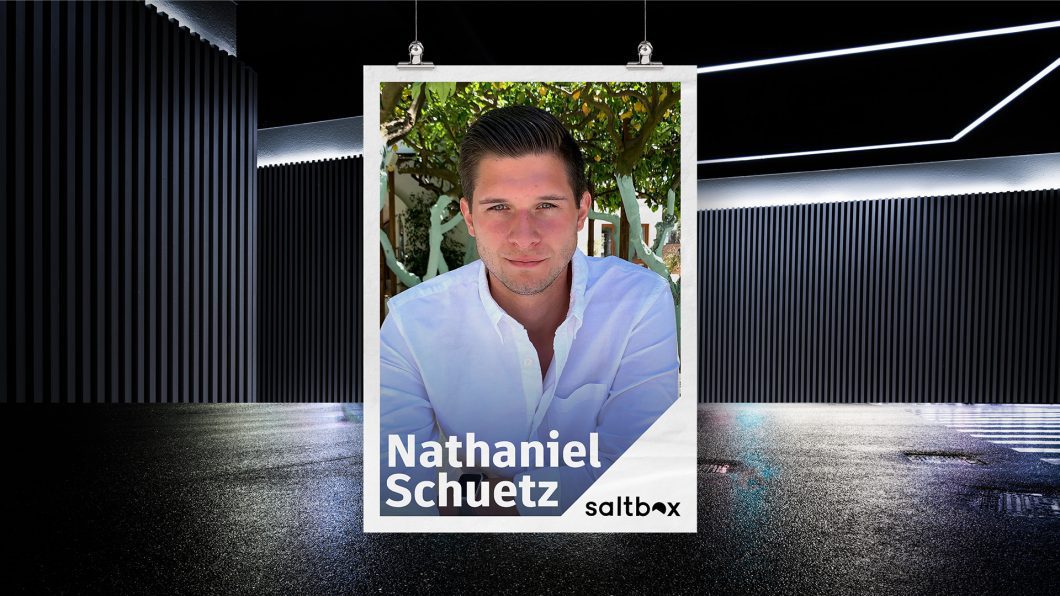
The construction industry has seen impressive growth over the last several decades, and with that growth has come major opportunities for those who want to take advantage of them. From getting involved in small builds to working with small businesses, there are opportunities for people to try new roles and experiences to find their niche in the industry.
Being a jack of all trades is something that Nate Schuetz, Construction Manager at Saltbox, knows something about. We recently had an opportunity to hear his insight on what it takes to be a construction manager at a startup.
Saltbox at its core is a logistics enablement startup. We provide what’s called Co-warehousing space for a variety of businesses, both large and small. We offer warehouse suites in a variety of sizes with flexible terms, along with office suites and all the equipment and convenience required to run a physical products business. In addition we provide all the comforts of a modern co-working space, which include full building WIFI, temperature-controlled warehouse and office space, comfortable, secured, and functional facilities, as well as a mobile app to book on-site labor, fulfillment, a photography studio, and more.
Once someone leases a warehouse suite or office space, they also get a membership to use our shared amenities. We have a couple of different co-working spaces like conference rooms and relaxing oasis spaces where people can just sit down and relax, take a meeting, or get some work done.
We see ourselves as a value add for ecommerce businesses who are just starting out because we provide tools and resources to help them grow. Ultimately, we want our members to be successful and pleased with our offering, because customer service is the best way to retain and enable the success of each of these businesses who are at the core of what we do.
What we are doing is helping (historically underserved) businesses who have physical space and logistics needs related to the physical product that they sell, succeed.
My role in all this is to oversee construction and build out new locations to further expand our reach and our logistics network to benefit ecommerce businesses nationwide. I work closely with the real estate, construction, design, and operations teams to find the right opportunities and make sure they’re realistic and ultimately function well.
It happened by chance. At the start of my career, I worked for a national general contractor for several years after interning with them in college. It seemed like a good fit, and it was a great company.
I was there for a few years and joined their rotational program, so I got to experience several roles. I worked in estimating, was a superintendent, and also did project management.
Ultimately, I decided that I wanted to move into negotiating contracts and deals with subcontractors. I went into purchasing, which then segued me into procurement and contract negotiation. I moved over to the owner’s side from there and went to work for a well-known luxury retail company. I joined as a Sr. Sourcing Specialist within global store development.
I was, at that time, in charge of identifying professional services such as general contractors, engineers, architects, and others and negotiating contracts with them for our global portfolio of new projects. I thought it was a great opportunity, but I wanted to get back into project management where I would be more immersed in construction projects. I was also looking for an opportunity to build more than just projects, I wanted to take my ideas and knowledge and build out a construction department at a fast growing but young company, which led me to finding a startup: Saltbox.
I saw what Saltbox was doing and was instantly captivated by the concept and mission they were pursuing. The idea of co-warehousing seemed so obvious, that I was surprised no one else was doing it. For me it was a no brainer, so I decided to reach out in an effort to fill their job opening of project manager, and was ultimately successful in my pursuit.
"I saw what Saltbox was doing and was instantly captivated by the concept and mission they were pursuing."
Shortly after joining the team I took over project management from one of the founders, and since then have been overseeing the success and drive of the projects we have open, as well as those that will be opening.
In my opinion, my team. Seeing the success they’ve had so quickly from joining with no context to seeing them run these projects better than I ever did has been really impressive. I enjoy seeing growth, not only with our locations, but also with the team. It's been an extremely rewarding opportunity, and we're just getting started.
We’re in a state of rapid growth, so we’re all wearing multiple hats on a regular basis. That said, I may have a view today of what my role could look like, but that could drastically change a week or a month from now depending on what’s needed from me at that time. However, based on the current state, I see my role as a leadership and support function that ensures we’re staying on track. I see potential for my role to expand to overseeing additional categories like procurement and pre-construction, while remaining very close to the design and real estate teams.
Saltbox is unique in how we approach expansion, build outs, and real estate. Our deal structures are often complex, and this complexity trickles down into how we manage projects. Our challenge has been finding tools and standard procedures that work all the time, every time for our evolving structures.
Software is not always the most accommodating to the concept flexibility because in a lot of ways software by design has limitations. We’ve found this in a few instances with construction softwares in the past. However, we understand the value that a good construction software brings.
We took our time vetting construction software this time around, and ultimately decided on: Autodesk Build. This was due to its flexibility, value for money, and overall incredibly thoughtful tools and functionality. This software will help us to streamline processes like billing, document management, budgeting, estimating & procurement, punch list, and overall collaboration. It’s robust and also super intuitive.
I think what I’m most excited about is being able to pull data out of the tool when we really “get into the weeds.” Project data is incredibly important to us and allows us to become more efficient as we bring more and more into the tool and expand it across different departments to collaborate more cohesively. Being able to collaborate more closely with our external partners is exciting as well. I think there are a lot of opportunities if we use the tool well.
The Cost Management tool in particular is highly customizable, but at the same time stays within a framework. We can set up, for example, cost codes at the global level, but project managers can apply cost codes in a way that makes sense to their project. As a data guy, that’s exciting to me. I like to understand things through the numbers; having them all filtered and organized is a huge advantage for us.
What I think is particularly relevant here is the flexibility of the software. We’re still a young company and will be growing a lot over the next few years. We know, especially with a long-term commitment, that the tools will still make sense for us no matter how we develop. By working with this tool from such an early age, we are able to become smarter faster and ultimately grow more quickly because of that.
At the heart of all our plans, we’re putting a lot of weight on Autodesk. We see how it has the potential to optimize our business. Outside of that, we’re looking at pulling information out of the projects to identify areas in which we can improve, which we think will ultimately promote creativity and innovation.
We are at a really interesting time in our industry. There are a lot of opportunities and many ways to make an impact on the industry if you have the right interest and desire to learn and improve upon what was done before you.
If you have an interest in a particular area of construction, pursue it. You never know where your path is going to lead. You always underestimate your own impact until it’s realized. Put plainly, just go after it, and don’t be afraid to jump in head first.
